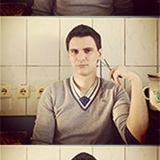О воспитании детей. Моему сыну Льву — 2 года и 7 месяцев, дочери Еве — 6 месяцев. До рождения Льва я пытался прочитать несколько книг про воспитание, а потом как-то само пошло-поехало и стало не до того.
Мне вообще нравится идея, что прикольнее не решать проблемы с учебником в руках, а быстро закинуться разными знаниями по-максимуму, а потом бросаться с этим как-то жить. Мозг — отлично обучаемая нейросеть. В процессе он сам вспомнит важное и сплетёт из кусочков информации и опыта все нужные решения.
Теперь задумался, а что у меня в голове «сплелось» за два с лишним года. Получилось такое, нехитрое:
0.
Детей особенно воспитывать не надо, сами справятся.
1.
Ограничения должны касаться в основном безопасности и личной свободы других людей. Облизывать шкаф — можно, вылить кефир в свои макароны — можно, не есть — можно. Мешать папе работать — нельзя, кричать, когда другие спят, — нельзя. Ограничений должно быть поменьше, они должны быть максимально чётко и просто сформулированы. Со всем остальным пусть ребёнок экспериментирует свободно.
2.
Наказания должны быть заранее известными и неотвратимыми. Короче, полностью предсказуемыми. Неясная или сбоящая причинно-следственная связь расшатывает нервы и детям, и родителям. Включая историю, когда детские сопли и слёзы так трогают родителей, что они отменяют наказание. Раз за разом. Ребёнок поймёт, что слёзы «работают» и с успехом продолжит. И ещё. Родительские крики и свирепое выражение лица — не часть наказания, а симптомы, с которыми взрослому надо бежать к психиатру.
3.
Мама и папа всегда заодно. Мама наказала, забрав игрушку — значит так было надо. Нет, папа тоже не вернёт игрушку, увидишь её завтра. Да, папа тоже тебя любит. И мама. Нет, игрушку не увидишь, ты знаешь наши правила. Да, ты больше так не будешь, вообще не вопрос, но с игрушкой ты поиграешь завтра. (У нас недавно появилась полка для арестованных игрушек. Очень удобно, ничего не путается.)
4.
Старшему ребёнку никогда не надо говорить, что он старший и поэтому должен то и то (помогать, уступить, отдать самое вкусное, подождать в сторонке). Во-первых, это портит ему детство и отношения с младшим. Во-вторых, ничего такого он не должен, потому что не по своей воле родился первым.
5.
Чем истеричнее и беспокойнее ведёт себя ребёнок — тем спокойнее и последовательнее взрослый.
6.
Пугать детей нельзя вообще никогда и ничем. Мама разлюбит, полицейский заберёт, сосед придёт и отругает, уйдём и оставим тебя одного — полное днище. Объяснять не буду. Ратую за принудительную госпитализацию идиотов, которые калечат этим детей.
7.
Не сравнивать. «Маша в 2 года бойко разговаривает и зачитывает стихи с табуретки». «Андрей плавает лучше». «Кристина не дерётся и со всеми ладит». Вообще пофигу. Удачи, и держитесь там! Если желать детям счастья, а не высоких оценок, то для него вся эта чепуха не нужна. Равнение на других ломает людям мозги и веру в себя. Чёрный пояс — это когда ты даже не хочешь сказать: «Ты у меня самый лучший!». Потому что «лучший» — сравнение, ага :–)
8.
Давать выбор и учить слушать свои желания. Нерешительные и несчастные взрослые вырастают из детей, за которых всё заботливо решали в детстве и не спрашивали, чего им хочется. На самом деле, выбирать можно почти всё: кашу, игрушки, мультик, книгу, одежду, план на выходные. Пользуйтесь! Выбор должен быть настоящим, а не как в выдуманной фразе Генри Форда: «Цвет автомобиля может быть любым, при условии, что этот цвет будет чёрным» :–) Дать всё сломать и испортить тоже полезно — запаситесь тем, что не жалко. Чем больше ребёнок принимает решения свой головой, тем лучше ему будет через 20 лет.
9.
«Делай так» — не работает. Личный пример — постепенно начинает работать.
10.
Любовь — не часть сделки. Родители любят ребёнка не за успехи, хорошее поведение, оправдание ожиданий (какие нафиг ожидания? это другой человек!) и другую такую чушь. Они его просто любят, без условий.
(Можно не добавлять пункт, что детей нельзя унижать или бить и за это можно сажать в тюрьму?)
Какие-то из этих принципов у нас работают лучше, другие даются с большим трудом. Но прогресс вижу. Думаю, через 10 лет список принципов увеличится ещё на 5-6.
На фотке к посту мы еле живые выползли из машины отдохнуть по пути из Витебска в Ригу :–)
Мне вообще нравится идея, что прикольнее не решать проблемы с учебником в руках, а быстро закинуться разными знаниями по-максимуму, а потом бросаться с этим как-то жить. Мозг — отлично обучаемая нейросеть. В процессе он сам вспомнит важное и сплетёт из кусочков информации и опыта все нужные решения.
Теперь задумался, а что у меня в голове «сплелось» за два с лишним года. Получилось такое, нехитрое:
0.
Детей особенно воспитывать не надо, сами справятся.
1.
Ограничения должны касаться в основном безопасности и личной свободы других людей. Облизывать шкаф — можно, вылить кефир в свои макароны — можно, не есть — можно. Мешать папе работать — нельзя, кричать, когда другие спят, — нельзя. Ограничений должно быть поменьше, они должны быть максимально чётко и просто сформулированы. Со всем остальным пусть ребёнок экспериментирует свободно.
2.
Наказания должны быть заранее известными и неотвратимыми. Короче, полностью предсказуемыми. Неясная или сбоящая причинно-следственная связь расшатывает нервы и детям, и родителям. Включая историю, когда детские сопли и слёзы так трогают родителей, что они отменяют наказание. Раз за разом. Ребёнок поймёт, что слёзы «работают» и с успехом продолжит. И ещё. Родительские крики и свирепое выражение лица — не часть наказания, а симптомы, с которыми взрослому надо бежать к психиатру.
3.
Мама и папа всегда заодно. Мама наказала, забрав игрушку — значит так было надо. Нет, папа тоже не вернёт игрушку, увидишь её завтра. Да, папа тоже тебя любит. И мама. Нет, игрушку не увидишь, ты знаешь наши правила. Да, ты больше так не будешь, вообще не вопрос, но с игрушкой ты поиграешь завтра. (У нас недавно появилась полка для арестованных игрушек. Очень удобно, ничего не путается.)
4.
Старшему ребёнку никогда не надо говорить, что он старший и поэтому должен то и то (помогать, уступить, отдать самое вкусное, подождать в сторонке). Во-первых, это портит ему детство и отношения с младшим. Во-вторых, ничего такого он не должен, потому что не по своей воле родился первым.
5.
Чем истеричнее и беспокойнее ведёт себя ребёнок — тем спокойнее и последовательнее взрослый.
6.
Пугать детей нельзя вообще никогда и ничем. Мама разлюбит, полицейский заберёт, сосед придёт и отругает, уйдём и оставим тебя одного — полное днище. Объяснять не буду. Ратую за принудительную госпитализацию идиотов, которые калечат этим детей.
7.
Не сравнивать. «Маша в 2 года бойко разговаривает и зачитывает стихи с табуретки». «Андрей плавает лучше». «Кристина не дерётся и со всеми ладит». Вообще пофигу. Удачи, и держитесь там! Если желать детям счастья, а не высоких оценок, то для него вся эта чепуха не нужна. Равнение на других ломает людям мозги и веру в себя. Чёрный пояс — это когда ты даже не хочешь сказать: «Ты у меня самый лучший!». Потому что «лучший» — сравнение, ага :–)
8.
Давать выбор и учить слушать свои желания. Нерешительные и несчастные взрослые вырастают из детей, за которых всё заботливо решали в детстве и не спрашивали, чего им хочется. На самом деле, выбирать можно почти всё: кашу, игрушки, мультик, книгу, одежду, план на выходные. Пользуйтесь! Выбор должен быть настоящим, а не как в выдуманной фразе Генри Форда: «Цвет автомобиля может быть любым, при условии, что этот цвет будет чёрным» :–) Дать всё сломать и испортить тоже полезно — запаситесь тем, что не жалко. Чем больше ребёнок принимает решения свой головой, тем лучше ему будет через 20 лет.
9.
«Делай так» — не работает. Личный пример — постепенно начинает работать.
10.
Любовь — не часть сделки. Родители любят ребёнка не за успехи, хорошее поведение, оправдание ожиданий (какие нафиг ожидания? это другой человек!) и другую такую чушь. Они его просто любят, без условий.
(Можно не добавлять пункт, что детей нельзя унижать или бить и за это можно сажать в тюрьму?)
Какие-то из этих принципов у нас работают лучше, другие даются с большим трудом. Но прогресс вижу. Думаю, через 10 лет список принципов увеличится ещё на 5-6.
На фотке к посту мы еле живые выползли из машины отдохнуть по пути из Витебска в Ригу :–)
About parenting. My son Leo - 2 years and 7 months, daughter Eve - 6 months. Before the birth of Leo, I tried to read several books about education, and then somehow I went and went, and it was not until that.
In general, I like the idea that it’s more fun not to solve problems with a textbook in your hands, but to quickly throw different knowledge to the maximum, and then rush into it somehow to live. The brain is an excellently trained neural network. In the process, he himself will remember the important and weave from the pieces of information and experience all the necessary decisions.
Now I’m thinking about what has “intertwined” in my head for more than two years. It turned out such a simple one:
0.
Children do not need to be raised especially, they can handle it themselves.
1.
Restrictions should concern mainly the security and personal freedom of others. Lick the cupboard - you can pour the kefir into your pasta - you can, do not eat - you can. It’s impossible to stop Dad from working, and screaming when others are sleeping is impossible. There should be fewer restrictions, they should be as clear and simple as possible. With everything else, let the child experiment freely.
2.
Punishments must be known in advance and inevitable. In short, completely predictable. An unclear or malfunctioning causal relationship shakes the nerves of both children and parents. Including the story when children's snot and tears touch their parents so much that they cancel the punishment. Every now and again. The child will understand that the tears "work" and continue successfully. And further. Parental screams and a fierce expression on the face are not part of the punishment, but symptoms that an adult needs to run to a psychiatrist.
3.
Mom and Dad are always together. Mom punished by taking the toy - so it was necessary. No, dad will not return the toy either, you will see it tomorrow. Yes, dad loves you too. And mother. No, you won’t see the toy, you know our rules. Yes, you won’t be like that anymore, it’s not a question at all, but with a toy you’ll play tomorrow. (We recently had a shelf for arrested toys. Very convenient, nothing gets confused.)
4.
The oldest child never needs to say that he is the oldest and therefore must do this and that (to help, give in, give the most delicious, wait aside). Firstly, it spoils his childhood and relations with the younger. Secondly, he shouldn’t do anything because he was not the first to be born of his own free will.
five.
The more hysterical and restless the child behaves, the calmer and more consistent the adult.
6.
It’s impossible to scare children at all, never at all. Mom will fall out of love, the policeman will take, the neighbor will come and scold, we will leave and leave you alone - the full bottom. I will not explain. I am for the forced hospitalization of idiots who cripple these children.
7.
Do not compare. “Masha at the age of 2 speaks smartly and reads verses from a stool.” "Andrei swims better." "Christina does not fight and gets along with everyone." I don’t care at all. Good luck, and hold on there! If you wish children happiness and not high grades, then for him all this nonsense is not needed. Being equal to others breaks people's brains and self-confidence. The black belt is when you don’t even want to say: “You are my best!” Because the “best” is a comparison, yeah :–)
8.
Give choices and learn to listen to your desires. Indecisive and unhappy adults grow out of children, for whom everything was carefully decided in childhood and did not ask what they wanted. In fact, you can choose almost everything: porridge, toys, a cartoon, a book, clothes, a weekend plan. Use it! The choice should be real, and not as in Henry Ford’s fictitious phrase: “The color of the car can be any, provided that this color is black” :–) To let everything break down and ruin it is also useful - stock up on what is not a pity. The more a child makes decisions with his head, the better he will be in 20 years.
nine.
“Do this” does not work. Personal example - gradually starts to work.
ten.
Love is not part of the deal. Parents love the child not for success, good behavior, justification of expectations (what nafig expectations? This is another person!) And other such nonsense. They just love him, without conditions.
(You can not add the clause that children can not be humiliated or beaten and that you can be put in jail for this?)
Some of these principles work better with us, others are given with great difficulty. But I see progress. I think in 10 years the list of principles will increase by another 5-6.
In the photo for the post, we barely crawled out of the car to relax on the way from Vitebsk to Riga :–)
In general, I like the idea that it’s more fun not to solve problems with a textbook in your hands, but to quickly throw different knowledge to the maximum, and then rush into it somehow to live. The brain is an excellently trained neural network. In the process, he himself will remember the important and weave from the pieces of information and experience all the necessary decisions.
Now I’m thinking about what has “intertwined” in my head for more than two years. It turned out such a simple one:
0.
Children do not need to be raised especially, they can handle it themselves.
1.
Restrictions should concern mainly the security and personal freedom of others. Lick the cupboard - you can pour the kefir into your pasta - you can, do not eat - you can. It’s impossible to stop Dad from working, and screaming when others are sleeping is impossible. There should be fewer restrictions, they should be as clear and simple as possible. With everything else, let the child experiment freely.
2.
Punishments must be known in advance and inevitable. In short, completely predictable. An unclear or malfunctioning causal relationship shakes the nerves of both children and parents. Including the story when children's snot and tears touch their parents so much that they cancel the punishment. Every now and again. The child will understand that the tears "work" and continue successfully. And further. Parental screams and a fierce expression on the face are not part of the punishment, but symptoms that an adult needs to run to a psychiatrist.
3.
Mom and Dad are always together. Mom punished by taking the toy - so it was necessary. No, dad will not return the toy either, you will see it tomorrow. Yes, dad loves you too. And mother. No, you won’t see the toy, you know our rules. Yes, you won’t be like that anymore, it’s not a question at all, but with a toy you’ll play tomorrow. (We recently had a shelf for arrested toys. Very convenient, nothing gets confused.)
4.
The oldest child never needs to say that he is the oldest and therefore must do this and that (to help, give in, give the most delicious, wait aside). Firstly, it spoils his childhood and relations with the younger. Secondly, he shouldn’t do anything because he was not the first to be born of his own free will.
five.
The more hysterical and restless the child behaves, the calmer and more consistent the adult.
6.
It’s impossible to scare children at all, never at all. Mom will fall out of love, the policeman will take, the neighbor will come and scold, we will leave and leave you alone - the full bottom. I will not explain. I am for the forced hospitalization of idiots who cripple these children.
7.
Do not compare. “Masha at the age of 2 speaks smartly and reads verses from a stool.” "Andrei swims better." "Christina does not fight and gets along with everyone." I don’t care at all. Good luck, and hold on there! If you wish children happiness and not high grades, then for him all this nonsense is not needed. Being equal to others breaks people's brains and self-confidence. The black belt is when you don’t even want to say: “You are my best!” Because the “best” is a comparison, yeah :–)
8.
Give choices and learn to listen to your desires. Indecisive and unhappy adults grow out of children, for whom everything was carefully decided in childhood and did not ask what they wanted. In fact, you can choose almost everything: porridge, toys, a cartoon, a book, clothes, a weekend plan. Use it! The choice should be real, and not as in Henry Ford’s fictitious phrase: “The color of the car can be any, provided that this color is black” :–) To let everything break down and ruin it is also useful - stock up on what is not a pity. The more a child makes decisions with his head, the better he will be in 20 years.
nine.
“Do this” does not work. Personal example - gradually starts to work.
ten.
Love is not part of the deal. Parents love the child not for success, good behavior, justification of expectations (what nafig expectations? This is another person!) And other such nonsense. They just love him, without conditions.
(You can not add the clause that children can not be humiliated or beaten and that you can be put in jail for this?)
Some of these principles work better with us, others are given with great difficulty. But I see progress. I think in 10 years the list of principles will increase by another 5-6.
In the photo for the post, we barely crawled out of the car to relax on the way from Vitebsk to Riga :–)

У записи 120 лайков,
12 репостов.
12 репостов.
Эту запись оставил(а) на своей стене Никита Иванов





































































